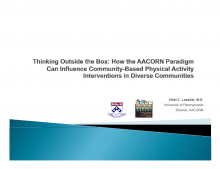Participation in physical activity is low, while prevalence of chronic diseases associated with low levels of physical activity is high in racial/ethnic minority groups compared to whites. The African American Collaborative Obesity Research Network (AACORN) expanded obesity paradigm calls for a broader understanding of how culture and mindset, environmental factors, and historical and social factors influence behavior to develop effective interventions focused on eating, physical activity, and weight. Consideration of these important factors in the context of community-based participatory research, can lead to unique strategies that successfully engage diverse communities in health-related behaviors. During this workshop presenters: 1) described the AACORN paradigm, 2) briefly discussed several research studies in which elements of the AACORN paradigm have been incorporated, and 3) using case studies, engaged the participants in discussions about how the AACORN paradigm might be used to increase cultural relevance of physical activity programs for racial/ethnic minority communities.
Learning Objectives:
-
Demonstrate an understanding of the AACORN paradigm and how it can be (and has been) used to influence development of physical activity interventions for diverse populations.
-
Generate ideas for applying the AACORN paradigm to modify an existing physical activity intervention to increase applicability for use in diverse populations.
-
Apply the AACORN paradigm during tabletop discussions of exemplar case studies to facilitate further understanding of how to use the paradigm.








